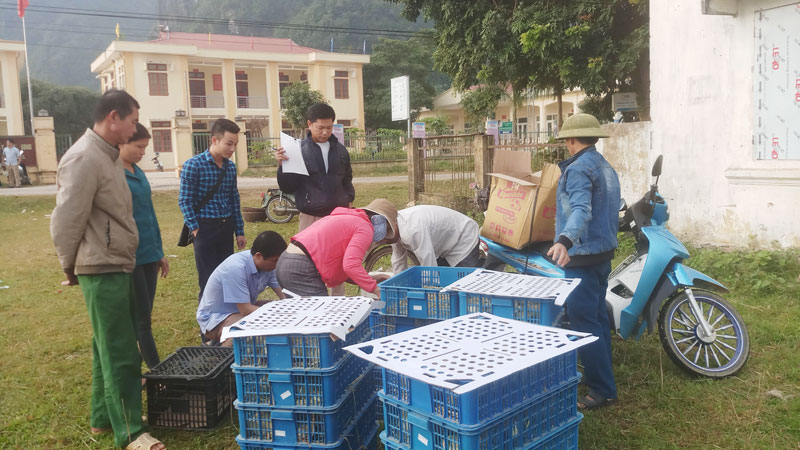
(HBO) - Programme 135, one of the component projects of the National Target Programme on Sustainable Poverty Reduction, is a proof of the sound policies of the Party and State for remote and disadvantaged areas. Its implementation over the past years has brought practical benefits to ethnic minority groups in Hoa Binh province.
 In
2019, poor households in Huu Loi commue (Yen Thuy district) were provided with chicken under a project to support production
and diversify livelihood in the locality.
In
2019, poor households in Huu Loi commue (Yen Thuy district) were provided with chicken under a project to support production
and diversify livelihood in the locality.
Hoa Binh was allocated 170.2 trillion VND from the State budget for
implementing the programme in 2019. The capital was used for constructing infrastructure
systems, supporting production activities, diversifying livelihoods, expanding effective
poverty reduction models, maintaining infrastructure works after construction,
and improving capacity of grassroots officials and the community.
Accordingly, as many as 288 infrastructure works for transport, irrigation,
health, school and water supply were constructed.
Meanwhile, the programme provided 12,500 poor and near households, and target
groups in Hoa Binh with over 299,750 young trees, 3,546 kg of food crop seeds,
over 122,400 young cattle and poultry, 46,369 tonnes of fertilizers, 17,466
doses of veterinary medicine, along with materials and tools for agricultural
production.
The programme also helped develop eight agricultural production
models in the locality.
In 2020, over 118 trillion VND has been allocated to the locality under
Programme 135 to implement 30 unfinished projects and 170 new ones. Meanwhile,
an estimated 7.43 trillion VND will be disbursed for repairing and upgrading completed
infrastructure works; 26.85 trillion VND for supporting production activities, and
7 billion VND for improving the capacity of grassroots officials and the
community.
These investments are quite important for promoting development in
disadvantaged communes.
In the 2018-2019 period, the agencies and organisations assigned to implement
Programme 135 conducted many practical and effective activities to promote socio-economic
development and poverty reduction in disadvantaged communes and villages. As
many as six communes with 73 villages completed targets of the programme.
Accordingly, the provincial People’s Committee requested agencies and units to help
communes effectively implement the support for disadvantaged villages and hamlets;
and continue to provide assistance for areas that had already realised
objectives of the programme for the period 2017-2020./.
More than just an information technology teacher, Bui Van Nien is an inspiring figure who has nurtured the scientific curiosity and creative spirit of students in Vietnam’s ethnic minority communities.
Da Bac is the most disadvantaged mountainous district in Hoa Binh province, with ethnic minorities accounting for about 90% of its population. Over the past years, the district has mobilised resources to implement ethnic policies to improve the quality of life of local people.
In recent years, Hoa Binh province has consistently prioritised the protection, care, and education of children, particularly those from ethnic minorities and disadvantaged backgrounds, by creating a safe, healthy, and nurturing environment for their all-round development.
The Steering Committee for Tobacco Harm Prevention and Control of Hoa Binh province, in coordination with the Tobacco Harm Prevention and Control Fund, held a ceremony on May 28 in response to the World No Tobacco Day (May 31) and the National No Tobacco Week (from May 25 to 31). The event was chaired by Nguyen Van Toan, Standing Vice Chairman of the provincial People’s Committee and head of the Steering Committee.
Since 2021, the Center for Industrial Promotion and Industrial Development Consulting (CIIDC) under the Department of Industry and Trade has been implementing a school lighting model as part of the plan for using energy efficiently and economically in Hoa Binh Province in the pẻiod of 2021 - 2025. This model not only aims to improve the learning conditions and enhance the education quality, but it also promotes the message of energy saving, energy security, environmental protection and contributes to the goals of socio-economic development.
In the 2024 - 2025 school year, the entire Hoa Binh provincial education sector includes 520 educational institutions and schools. Among them are 13 ethnic boarding schools with 153 classes and 4,487 students. Four of these schools have met national standards, reaching 30.7 percent.



 In
2019, poor households in Huu Loi commue (Yen Thuy district) were provided with chicken under a project to support production
and diversify livelihood in the locality.
In
2019, poor households in Huu Loi commue (Yen Thuy district) were provided with chicken under a project to support production
and diversify livelihood in the locality.